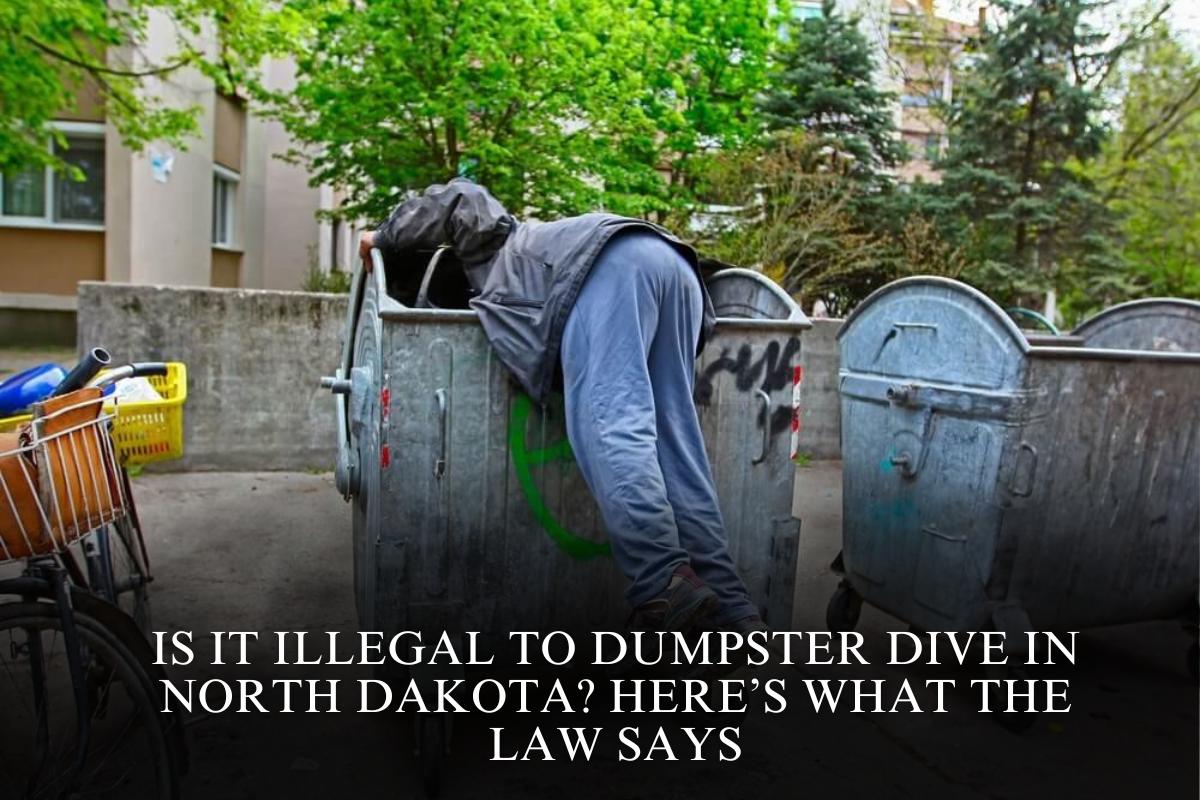Dumpster diving—searching through trash bins or dumpsters to recover discarded items—has become a popular activity for various reasons, from environmental conservation to personal necessity and curiosity.
Yet the legality of this practice varies across states and municipalities, often depending on property rights and local ordinances. For residents and visitors in North Dakota wondering if dumpster diving is legal and under what conditions, here is a clear explanation of the current legal landscape in 2025.
Dumpster Diving Is Not Outright Illegal in North Dakota
In North Dakota, dumpster diving is generally not prohibited by state law. Unlike some states that explicitly ban or restrict the practice, North Dakota does not have broad statutes that make searching through public or accessible dumpsters illegal. The lack of a statewide ban means that, in principle, individuals can legally dive through garbage containers accessible to the public to recover discarded items.
This open stance aligns with a 1988 U.S. Supreme Court ruling in California v. Greenwood, which ruled that once trash is left for collection in publicly accessible areas, the owner relinquishes privacy rights and ownership, effectively making discarded materials part of the public domain.
However, legal diving in North Dakota is not without caveats—local ordinances and private property rights play significant roles in determining what is allowed.
Respect Local Ordinances and Private Property Boundaries
While state law does not criminalize dumpster diving, individual cities, towns, or counties within North Dakota may have ordinances regulating or restricting it. For example, some municipalities might prohibit scavenging from dumpsters located on public lands, or in commercial areas, especially for safety or health reasons.
Most importantly, dumpsters located on private property—including business premises, apartment complexes, or fenced industrial areas—are considered private property. Accessing these dumpsters without permission typically constitutes trespassing. North Dakota law, like elsewhere, allows property owners to prevent unauthorized entry and remove trespassers by legal means.
Therefore, diving without explicit consent on private property may subject an individual to trespassing charges, fines, or other penalties. Clear signage such as “No Trespassing” or locked dumpster enclosures reinforce these restrictions. To stay legal, divers should avoid private premises and locked dumpsters.
Best Practices for Legal Dumpster Diving in North Dakota
Choose Publicly Accessible Dumpsters: Focus on dumpsters located in public spaces or outside of private property boundaries.
Avoid Locked or Fenced Areas: Entering restricted or locked areas risks trespassing accusations.
Check Municipal Codes: Research local laws for any bans or limitations in the city or town where you dive.
Respect Safety Guidelines: Use proper hygiene and protective gear to avoid health risks.
Avoid Night-Time Diving in Residential Areas: While not expressly illegal, late-night dumpster diving in residential neighborhoods may cause disturbance complaints and increased scrutiny.
Is Nighttime Dumpster Diving Restricted?
North Dakota does not have specific laws against diving at night. However, many divers prefer nighttime to avoid attention and increase chances of finding valuable items after businesses discard products. Despite legal permissibility, divers should be cautious since police or private property owners may respond to complaints of loitering or trespassing during late hours.
Being discreet and mindful of community concerns helps avoid confrontations.
Dumpster Diving Legal but Limited by Local and Property Laws
In summary, dumpster diving in North Dakota is not illegal under state law, opening opportunities for scavenging valuable or useful items from publicly accessible trash. Yet legal issues arise chiefly when diving crosses into private property without permission or ignores local restrictions.
Anyone interested in dumpster diving must respect property boundaries and municipal laws to stay safe and within legal limits. Understanding when and where dumpster diving is allowed helps avoid trespassing violations and potential fines.
For a responsible and legal dumpster diving experience, divers should always seek permission from property owners, stay informed about local ordinances, and adhere to respectful, safety-conscious practices.
Sources
(https://worldpopulationreview.com/state-rankings/dumpster-diving-legal-states)
(https://keyzradio.com/is-dumpster-diving-legal-in-north-dakota/)
(https://detectingtreasures.com/dumpster-diving-in-north-dakota/)
(https://hot975fm.com/is-it-legal-to-dumpster-dive-in-north-dakota/)
(https://www.rolloffdumpsterdirect.com/dumpster-diving-illegal/)











